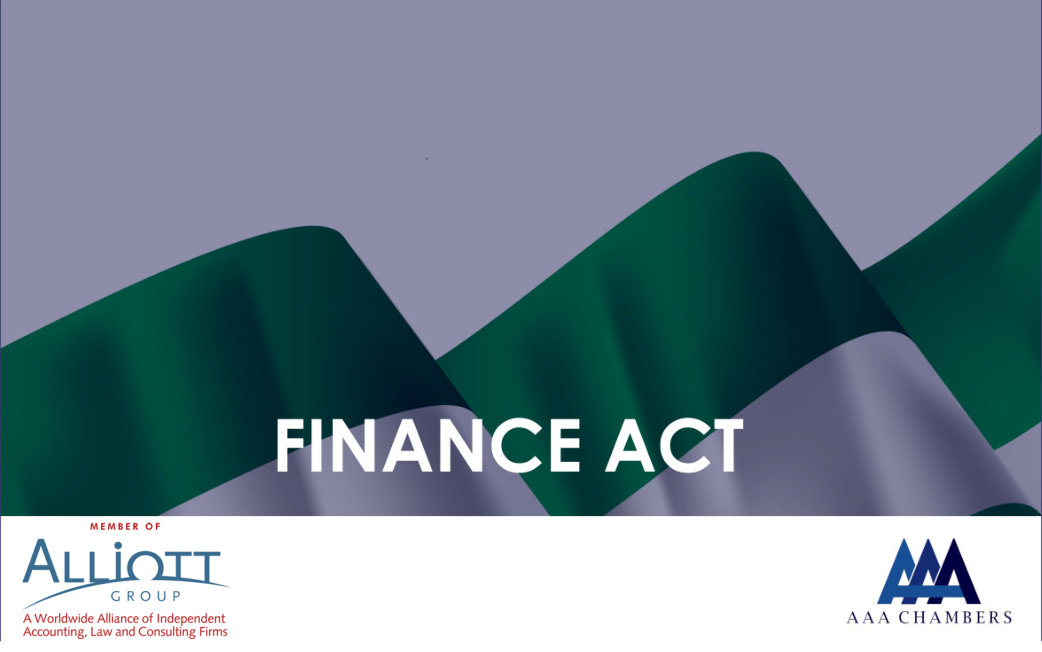by Damilola Bamisile Esq., Associate Counsel, AAA Chambers
INTRODUCTION
The Finance Act 2020 was signed into law by President Muhammadu Buhari on the 13th January 2020 as a review of tax laws to make them more responsive to reforms.
It must be stated that there is in existence an Act known as the Finance (Control and Management) Act which provides for the control and management of the public finances of the Federation. The Finance Act, on the other hand, serves as a review of tax laws in Nigeria. In this light, both Acts are distinct and unrelated. Thus, the Finance Act does not stand as a repeal to the former and one Act does not supersede the other.
THE FINANCE ACT
The Finance Act is a reformative law aimed at the tax sector. It deletes, amends and adds to the provisions of existing tax laws. The following are the laws amended by the Finance Act:
- Companies Income Tax Act
- Personal Income Tax
- Stamp Duties Act
- Custom and Excise Tariff
- Petroleum Profit Tax
- Capital Gains Tax
- Value Added Tax
OBJECTIVES OF THE NEW ACT
- To promote fiscal equity.
- Reforming existing tax laws to align with global best practices.
- Introducing tax incentives to encourage investments.
- To support small and medium-sized businesses in line with the ‘Ease of Doing Business’ Reforms.
- Raising Revenues for Federal and State Governments.
HIGHLIGHTS OF REFORMS
This article seeks to highlight some of the key reforms in existing tax laws with a focus on Companies Income Tax, Value Added Tax and Stamp Duties.
COMPANIES INCOME TAX ACT
The Companies Income tax is a prominent part of tax administration in Nigeria. The Finance Bill has made an attempt to align the company tax rate with global best practices by creating an equitable balance between small, medium and large revenue earners. The following are some of the changes made to the Company Income Tax Act.
-
Tax Exemption for Small companies
Before the Finance Act, there was no threshold for the classification of companies for the purposes of Company Income Tax. This means that the Company Income Tax was paid by all companies at the rate of 30%. Section 22 of the Finance Act has introduced a change in this regard. There is a new threshold for the classification of companies thus:
- A small company is a company with a gross revenue/turnover of N25,000,000 or less;
- A medium-sized company is a company that earns between N25,000,000 and N100,000,000;
- A large company is an entity which is neither a small nor medium-sized company, that is, a company with a turnover of N100,000,000 or greater.
See Section 22 of the Finance Act, 2019.
Section 16 of the Act further provides that medium-sized companies will be subject to tax at the rate of 20% while large companies will pay tax at the prevalent rate of 30%.
It is pertinent to state that small companies are now exempted from company income tax for the first five years of operation. See Section 3(1)(o) of the Companies Income Tax Act.
-
Tax Identification Number
Under the newly enacted Finance Act, every company is expected to have a tax identification number (TIN) which must be displayed on all business transactions, and official correspondences.
The Act further provides that banks must require all companies to provide their TIN as a prerequisite for account opening. While companies who have opened their accounts before now must provide their banks with the TIN within 3months after the passage of the Act. Section 10 of the Finance Act.
-
Amended Minimum Tax Rate:
The Act amends section 33 of the Companies Income Tax Act to the effect that when a company makes a loss, the minimum tax to be paid is 0.5% of gross turnover.
The Act further exempts small companies (with less than 25million turnover) from paying minimum tax. Section 14 of the Finance Act.
-
Incentives for Early Tax Remittance
The Act introduces a 2% and 1% bonus for medium and large companies respectively when they remit their income tax 90days before the due date. Section 18(c) of the Finance Act.
-
Excess Dividend Policy
The Excess Dividend rule is to the effect that where a company’s dividend exceeds the taxable profit for the year, then the dividend will be taxed at 30%. The Finance Act seeks to remedy instances where such dividends have been pooled from previous year’s profit (which must have been taxed) from tax-exempt profits, thereby, resulting in double taxation.
Thus, the Finance Act expressly provides in Section 7 that the Excess Dividend Policy will no longer apply to:
- Dividends paid out of profits that have already been taxed;
- Or paid out of profits that are exempted from tax under any legislation.

VALUE ADDED TAX ACT
The Act has also reformed some aspects of the Value Added Tax Act. The key focus of the amendment is to increase government revenue through a tax levied on good and services. An overall insight into the amendment of the Act are:
-
Increase in VAT rate
Prior to the Finance Act, the VAT rate was 5%. However, with the passage of the Finance Act, the effective tax rate on goods and services subject to VAT is 7.5%. Section 34 of the Finance Act.
-
Expanded list of VAT exempt products
VAT exemption list has been expanded to include locally manufactured sanitary towels while tax-exempt services have been expanded to include tuition relating to nursery, primary, secondary or tertiary education as well as services rendered by Microfinance banks. See Section 46 of the Finance Act.
Also present in the Act, is the definition of “basic food items” for the purpose of tax exemption, as agro and aqua-based staple foods which include items such as bread, cereals, cooking oil, milk, vegetables and water (excluding sparkling or flavoured). See also, Section 46 of the Finance Act.
-
Penalty for default
The penalty for late filings of VAT returns in the Finance Act is 10% of the tax not remitted and interest is to be charged on the default sum at the prevailing Central Bank of Nigeria rate. Section 43 of the Finance Act.
STAMP DUTIES ACT
-
Inclusion of Electronic Transactions
Under the Stamp Duties Act, ‘instrument’ is defined to mean written document but the Finance Act has reviewed the definition to include electronic documents. The term ‘stamp’ has also been reviewed to include electronic stamp.
The implication of this is that documents would be levied stamp duties in their electronic form. Section 54.
-
Stamp Duties on Bank Transfers
Section 54(3) provides that electronic transfers of funds of amounts of N10,000.00 or more attracts stamp duty of N50.
This means that transfers below N10,000.00 and transfers into an individual’s own account or transfers between accounts in the same bank are exempt from stamp duties.
PERCEIVED BENEFITS OF THE ACT
- Reforms such as the amendment of the Excess Dividend Policy would boost investors’ confidence in the economy as well as also minimize instances of double taxation.
- The increased VAT rate also provides stronger incentives for businesses to minimize costs.
PERCEIVED CHALLENGES IN THE ACT
- The incremental VAT rate will reduce the purchasing power of the majority of the population due to the fact that the high cost of production and investment would be passed on to the final consumers.
- The incentive of 1% and 2% to be given if payment is made 90days before the due date may be unrealistic and difficult to achieve by business owners.
RECOMMENDATIONS
- Adequate Sensitization: To achieve the reforms, it is recommended that the public be thoroughly enlightened about the changes brought about by the Finance Act as well as the effects of the changes. It is also suggested that tax authorities should issue guidelines and explanatory circulars to further provide clarity on any grey areas that may arise from the Act.
- Improved Database: With the introduction of the Tax Identification Number, it is recommended that the Federal Inland Revenue Service develop internal structures to further serve the purpose of integrating information and monitoring compliance by taxable persons.
- Improvement on Tax Incentives: In addition to the incentives provided in the Finance Act, It is recommended that further incentives should be introduced to encourage timely remittance of taxes.
- Transparency and Accountability: With the increase of the Value Added Tax rate from 5% to 7.5%, it is expected that the tax authorities will create a system of transparency that boosts the taxpayer’s confidence in the government of the day.


will a canadian pharmacy fill an american prescription [url=https://pharmacyhrn.com/ ]aarp approved canadian online pharmacies[/url] canada drugs reviews
cialis dosage for ed [url=https://cialishav.com/ ]bph cialis dosage[/url] cialis double dose